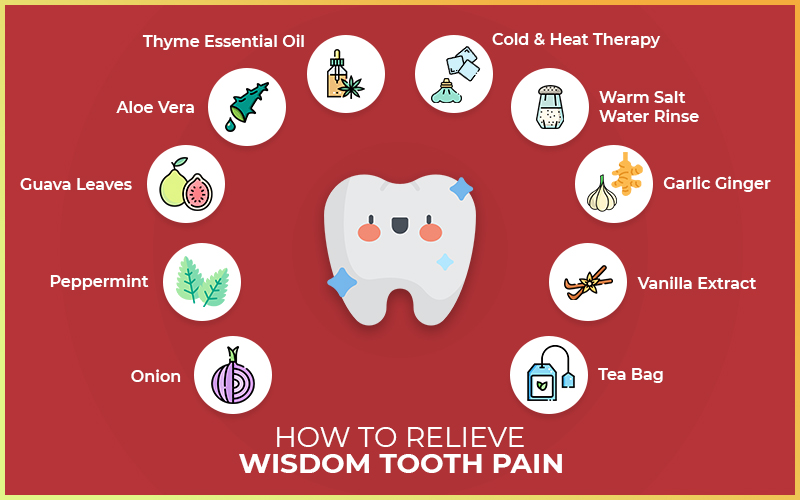8 Wisdom Teeth Removal Pain Meds For Fast Relief

The ordeal of wisdom teeth removal - a rite of passage for many, but often accompanied by considerable discomfort. As the wound begins to heal, the pain can be overwhelming, affecting not just the extraction site but also the surrounding areas, including the jaw, ear, and head. Fortunately, there are various pain medications and home remedies that can provide relief, helping you navigate this challenging period with greater ease. Here are 8 wisdom teeth removal pain meds and strategies for fast relief:
1. Ibuprofen (Advil, Motrin)
Ibuprofen is a nonsteroidal anti-inflammatory drug (NSAID) that is highly effective in managing pain and reducing inflammation. It’s often recommended by dentists due to its ability to alleviate both the pain and the swelling associated with wisdom teeth removal. However, it’s crucial to follow the prescribed dosage to avoid stomach upset or other side effects.
2. Acetaminophen (Tylenol)
Acetaminophen is another commonly used pain reliever that can help manage the pain following a wisdom teeth extraction. Unlike ibuprofen, it doesn’t have anti-inflammatory properties, but it’s a better option for those who cannot tolerate NSAIDs due to stomach issues or other reasons. Always adhere to the recommended dosage to avoid liver damage.
3. Naproxen (Aleve)
Naproxen is an NSAID with a longer duration of action compared to ibuprofen, providing pain relief for up to 12 hours. This can be particularly beneficial at night, ensuring uninterrupted sleep. Similar to ibuprofen, it helps with both pain and inflammation but should be taken with caution to avoid side effects.
4. Oxycodone (OxyContin)
In cases where the pain is more severe, your dentist might prescribe a stronger opioid pain reliever like oxycodone. This medication should be used with caution and only as directed, due to its potential for addiction and significant side effects. It’s essential to follow the prescription carefully and report any concerns to your healthcare provider.
5. Hydrocodone (Vicodin)
Hydrocodone, another opioid, is sometimes prescribed for managing moderate to severe pain after dental procedures. Like oxycodone, it requires careful use due to its potential for dependence. Always discuss the risks and benefits with your dentist and strictly adhere to the prescribed dosage.
6. Codeine
Codeine is a milder opioid that can be prescribed for pain relief, often in combination with acetaminophen. It’s less potent than oxycodone or hydrocodone but still effective for some patients. Codeine also carries the risk of dependence and should be used judiciously under medical supervision.
7. Gabapentin
Though primarily used to treat nerve pain and seizures, gabapentin can sometimes be prescribed off-label for managing pain after wisdom teeth removal, especially if there’s a neuropathic component to the pain. It works differently than traditional pain relievers and can provide relief when other options are ineffective.
8. Corticosteroids
In some cases, your dentist might prescribe a corticosteroid to reduce swelling and pain, especially if the extraction was complex or if you’re experiencing significant inflammation. These can be administered systemically or locally at the surgical site and are particularly useful in the initial post-operative period.
Additional Tips for Managing Pain After Wisdom Teeth Removal
- Apply Ice: Cold compresses can help reduce swelling and ease pain.
- Soft Foods: Stick to a diet of soft foods for a few days to avoid irritating the extraction site.
- Rest: Give your body time to heal by getting plenty of rest.
- Salt Water Rinse: Rinse your mouth with warm salt water to reduce swelling and relieve pain.
- Follow Instructions: Adhere strictly to the post-operative instructions provided by your dentist, including any medication regimen.
While these medications and strategies can offer significant relief, it’s essential to communicate openly with your dentist about your pain levels and any side effects from the medications. In some cases, a follow-up visit might be necessary to ensure that the healing process is progressing as expected and to adjust the pain management plan if needed. Remember, the pain from wisdom teeth removal is temporary, and with the right approach, it can be managed effectively, allowing you to recover smoothly and get back to your normal activities.
Frequently Asked Questions
What is the most effective pain reliever after wisdom teeth removal?
+The most effective pain reliever can vary depending on the individual and the specifics of the procedure. However, ibuprofen is often recommended due to its ability to reduce both pain and inflammation. It's essential to follow the prescribed dosage and consult with your dentist if the pain persists or worsens.
How long does pain typically last after wisdom teeth removal?
+Pain after wisdom teeth removal can last for several days, typically peaking within the first 24 to 48 hours. For most people, the pain begins to subside significantly within 3 to 5 days, but it can take up to a week or more for the mouth to fully heal and for the pain to completely disappear.
Can I use natural remedies to manage pain after wisdom teeth removal?
+Yes, several natural remedies and home care practices can help manage pain and aid in the healing process. These include applying cold compresses, rinsing with salt water, consuming soft foods, and getting adequate rest. While these methods are beneficial, they should be used in conjunction with, not in place of, any prescribed pain medications or post-operative instructions from your dentist.
By understanding the options available for pain management and following the guidance of your dental health professional, you can significantly reduce the discomfort associated with wisdom teeth removal and ensure a smoother, more comfortable recovery process.
